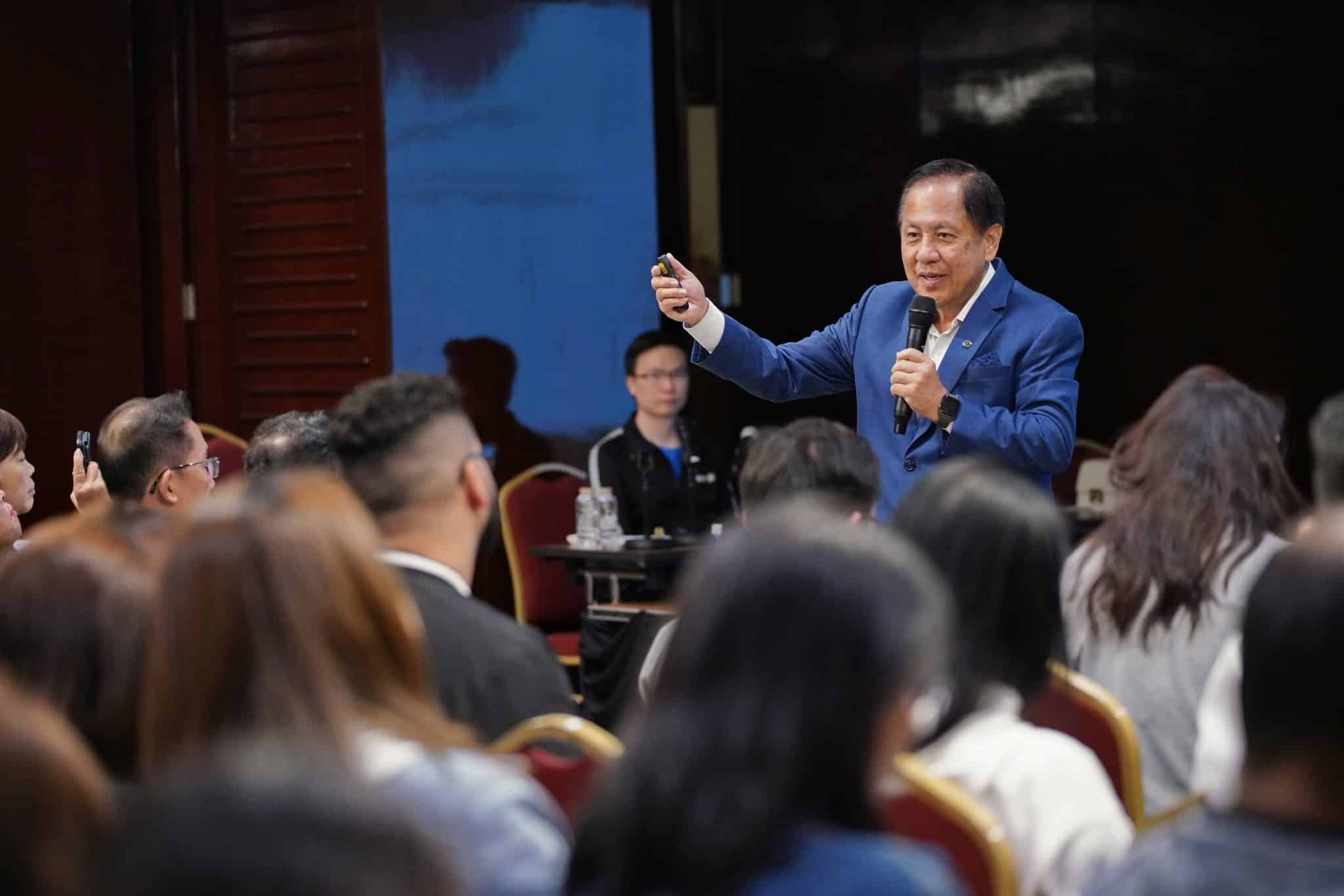Are your critics and your crises stopping you from evangelising? Here’s what Paul did: Ps Benny Ho
Pastor Benny Ho // November 4, 2022, 4:13 pm

"For the furtherance of the Gospel, every circumstance can be used. Everybody can be a prospect, be it friend or foe," says Ps Benny Ho.
Christians in the marketplace are adept at equipping and mentoring. But is there enough evangelism happening?
Not according to the findings from the latest National Marketplace Survey in Singapore and discussions at October’s Movement Day conference, points out Pastor Benny Ho, Senior Pastor of Faith Community Church in Perth, Australia, and a leading figure in marketplace ministry.
In a call to action to leaders at LoveSingapore’s ReStart Marketplace Track retreat on October 21-22, Pastor Benny urged the leaders to use “every circumstance” (Philippians 1:15-18) for the furtherance of the Gospel.
He shared shared three “unlikely” C’s – chains, critics and crises – that God used to enable Paul to advance the Gospel in Philippians 1.
Philippians is a letter that is full of joy.
At the time of writing, Paul was actually under house arrest in Rome for preaching the Gospel.
Even though Paul was in prison, the words “joy”, “rejoicing”, and “gladness” appear 19 times in four chapters. This is an amazing fact because his situation was nothing to rejoice about.
One of the secrets to joy is the attitude of the mind.
Here’s the picture: Paul was under house arrest and chained to a Roman guard. His trial was coming up and there was a real possibility that he could lose his head in the trial.
How could he still be joyful? And what was the secret to his joy?
The secret is in another word that appears 15 times in the book of Philippians: The word “mind”, “thought” or “think”.
One of the secrets to joy is the attitude of the mind: What is up here (in the mind) matters more than what is out there.
I like the way Oliver Wendell Holmes put it: What is behind us and what is before us are small things compared to what is within us.
And the question is this: What was on Paul’s mind that enabled him to be joyful in the midst of all the trials?
“Unlikely” tools
We see the focus of the Apostle Paul where he said in the first chapter: “The important thing is that in every way, whether from false motives or true, Christ is preached.” (Philippians 1:18)
That is my point: That Christ is preached.
Paul’s one consuming passion – his one primary focus – is that Christ is preached. That’s where his heart was, and if his circumstances, whether good or bad, could promote and advance the gospel, that was all that mattered.
In Philippians 1, we see three very unlikely things that God used to enable Paul to advance the Gospel in Caesar’s household and amongst the elite palace guard (Philippians 1:1-26):
1. Chains (Philippians 1:1-14)
You’ll see this from the first verse all the way to verse 14. Did the Romans know that the chains they fixed around his hands and legs did not restrict Paul but actually released him to preach the Gospel?
Paul’s chains didn’t restrict him, it actually released him.
That’s the irony of it. Because it didn’t restrict him, it actually released him.
Paul himself said: “Remember Jesus Christ raised from the dead, descended from David. This is my gospel for which I’m suffering, even to the point of being chained like a criminal. But the word of God is not chained.” (2 Timothy 2:8-9)
They could chain him, but the word of God continued to advance. He didn’t complain about his chains. In fact, he consecrated his chains to the Lord for the advancement of the Gospel.
What the devil meant for harm, God turned it around for His redemptive purposes.
Firstly, the chains put him in contact with the lost: Because Paul was chained to a Roman guard for 24 hours a day, he had a captive audience.
Because Paul was chained to a Roman guard for 24 hours a day – he had a captive audience.
Roman guards worked on six-hour shifts, which meant that Paul would have been chained to four different soldiers every single day. On top of that, it would have been a different man each time. Over 9,000 soldiers in the palace guard, all taking turns.
Can you imagine being chained to a guy like Paul? Someone who prays without ceasing, who speaks in tongues more than any other language, who writes scriptures all day long.
He sings psalms, hymns, spiritual songs, preaches Jesus non-stop … no wonder the elite palace guards were just coming to the Lord one by one. So much so that news of this reached the ears of the officials in Caesar’s household. (Philippians 1:13)
God can use your chains if you consecrate them to him instead of complaining about them.
Some of us feel that we are chained to our work, our boss, our business, our unsaved spouses.
God can use your chains if you consecrate them to him instead of complaining about them.
Susanna Wesley was chained to her 19 children. But out of that, she raised two, John and Charles Wesley, who became spiritual giants and changed the entire spiritual landscape of England.
Our chains can be platforms for ministry for the advancement of the Gospel.
The second thing Paul’s chains did was that it brought courage to the saved.
Because of what happened to Paul, the believers in Rome actually found a new courage. (Philippians 1:14) They all started talking about Jesus – not necessarily to preach but simply through everyday conversation.
If we make Christ and the Gospel the focus of our life, then even our chains – whatever you think is that disadvantage to you – can help us advance the kingdom of God.
2. Critics (Philippians 1:15-19)
Paul had a lot of critics. And for many of you who work in the marketplace, I’m sure you do as well.
But you’ll find that, when our minds are focused on the Lord and His great commission, even our critics can become stepping stones to success.
There were two groups of people who were preaching more because of Paul’s imprisonment. The first group was those who are inspired by him because of his chains – these were his friends. But there was a second group that Paul described as those who preached for “selfish ambition” (Philippians 1:16). Those were his critics.
Even our critics can become stepping stones to success.
That phrase “selfish ambition”, in Greek, literally means to canvas for office, to get others to support you.
So instead of going around asking, “Are you born again?”, they were literally asking, “Are you with me? Are you in my camp?” They were happy because Paul was in prison. Why? Their biggest competitor was out of the way now.
If Pepsi closed down for three months, guess what Coca-Cola would be doing?
They’d likely be going for the market share! That was what was happening. Because Paul was in prison, the rest started preaching even more. But they were preaching under their own banner. Not out of sincerity, but out of envy, strife, jealousy and competition.
What was Paul’s response to all of this?
He said: “But what does it matter? The important thing is that in every way, whether from false motives or true, Christ is preached. And because of this I rejoice.” (Philippians 1:18)
What an attitude! There was no envy, no bitterness, no resentment. All Paul did was to rejoice – not in their selfishness – but in the fact that Christ was preached.
The phrase, “what does it matter”, is a very powerful phrase.
When we serve God, we need to learn to use this phrase: What does it matter?
For those of us in ministry, we need to use it more often. The first time I was preparing to preach the book of Philippians, I was reading this passage and this phrase hit me, because too often, it does matter to me.
When we serve God, we need to learn how to use this phrase.
What does it matter if nobody acknowledges me? As long as Christ is preached.
What does it matter if my friends reject me? As long as Christ is preached.
What does it matter if I’m not that popular? As long as Christ is preached.
Paul is saying: My critics cannot steal my joy because I won’t let them.
Even our critics can be used by God to promote our aim on advancing the kingdom of God.
3. Crisis (Philippians 1:20)
Because of his crisis, Christ was magnified (Philippians 1:20, KJV). Christ became bigger because of his crisis. Because a crisis is where we see who Christ really is. That is what “magnify” is, it means to bring closer, to make bigger.
A crisis can be a magnifying glass that makes Him clearer and a microscope that makes Him bigger.
To us, Christ is big. He’s huge. To the pre-believer, Christ is not very big.
But a crisis can be a magnifying glass that makes Him clearer, a telescope that that brings Him nearer, and a microscope that makes Him bigger.
Paul declared in his crisis, “I want to make Christ bigger, not just for myself but for others to see. Not just in life, but even death, I want to exalt Christ.”
Here’s a man in the prime of his life about to face trial in Rome and facing premature death, and yet he can say this: For me to live is Christ, to die is gain. (Philippians 1:21)
Now we all know we will die one day. But for a young person in the prime of his life, the attitude that the Apostle Paul exhibits is simply profound.
What he is saying is: “I am very eager to go, but I don’t mind staying.”
For most of us, it’s the exact opposite: “I’m very eager to stay. But if really cannot help it and if there’s really no other way, then okay, take me home.”
The attitude is determined simply by this: Who or what am I living for? What turns us on, what excites us? What preoccupies us?
The attitude “to die is gain” is determined simply by this: Who or what am I living for?
How a man dies matters.
If we are living for this world, death is taking us away. Death means leaving everything behind.
If for me, to live is family, then to die is to leave them behind. If for me, to live is business, then to die is to close shop. If for me, to live is money, to die is to leave it all behind.
But if for us to live is Christ and to die is gain, and if that is our mentality, then I think whatever our chains, however many critics, whatever our crisis, Christ will be made known.
This is the attitude we need to bring to the marketplace: Let the furtherance of the Gospel be our focus.
RELATED STORIES:
“Be open to being challenged. Truth doesn’t mind being questioned”: Alpha pioneer Nicky Gumbel
We are an independent, non-profit organisation that relies on the generosity of our readers, such as yourself, to continue serving the kingdom. Every dollar donated goes directly back into our editorial coverage.
Would you consider partnering with us in our kingdom work by supporting us financially, either as a one-off donation, or a recurring pledge?
Support Salt&Light




